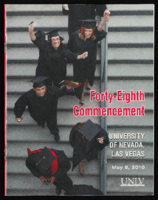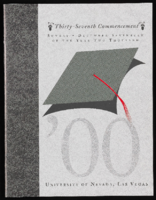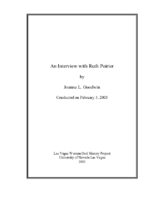Search the Special Collections and Archives Portal
Search Results

Transcript of interview with Joseph Thiriot by Claytee White, August 10, 2000
Date
Archival Collection
Description
Joseph Thiriot is a longtime Las Vegas resident who served the community as an educator. He was born in 1906 in Provo, Utah; one of five sons bom to George W. and Elvira Thiriot. He has vivid memories of moving about, including living in Idaho where his father sold a typing machine , a forerunner to the typewriter. Eventually the family moved to a ranch in Pahranagat Valley, Nevada, where the limits of educational opportunities compelled his paients to send him back to Provo to finish his education while living with family there. Gaining a teaching certificate enabled Joseph to teach in rural Nevada. He completed his degree at the University of Utah and after meeting Las Vegas Superintendent Maude Frazier he relocated to Las Vegas to become a teacher. He reminisces about his life and the changes that have occurred over the years in Las Vegas.
Text

Transcript of interview with Joe M. Wilcock by Claytee White, April 17, 18, & 30, 2014
Date
Archival Collection
Description
Chef and longtime gaming executive Joseph “Joe” Wilcock was born in Detroit and raised by his mother, Ruby, and stepfather, Ross Johnson, in Sarasota, Florida; Gary, Indiana; and Harlan, Kentucky. After he graduated from high school in Gary he moved to Chicago to attend Washburne Culinary Institute. While attending Washburne Joe worked at Chicago’s Drake Hotel and lived at the Sears YMCA. After earning his certificate from Washburne, Joe worked at the newly opened Holiday Inn in Chicago, the Sea View hotel in Bal Harbour, Florida, and a resort at Blowing Rock, North Carolina. At Blowing Rock he heard about the new School of Hotel Management at UNLV and in August 1969 23-year-old Joe headed for Las Vegas with $400 in his pocket. Las Vegas was a disappointment. Joe could not get a job as a chef without first joining Culinary Workers Union Local 226-which he could not afford to do. Also, because he ran a poker game and cooked at the Chuck Wagon Diner during high school his high school grade point average was roughly a C-, which hindered his admittance into the School of Hotel Management. Undaunted, Joe found a job bussing tables at the Frontier Hotel and joined the Culinary Union so he could work as a chef. He also took three classes at UNLV that semester, earned an A in each, and was admitted to the School of Hotel Management. While at UNLV he affiliated with Sigma Chi fraternity. In his career Joe has worked in all facets of the gaming industry in such Las Vegas properties as the Flamingo Capri, the Frontier, Caesars Palace, the Tropicana, the Dunes, the Golden Nugget, the Mirage, Treasure Island, the Sands, MGM, and the Downtown Grand. He learned the business from the ground up. He also worked at Caesars Tahoe and at different times owned and operated a sandwich shop and a bar. Joe married his wife, Linda, 38 years ago in Las Vegas, in 1976. He is currently employed as a casino shift manager at the Downtown Grand hotel and is affiliated with the House Corporation of Sigma Chi Alumni, UNLV Rebel Golf, the Las Vegas Natural History Museum, and Candlelighters Childhood Cancer Foundation of Nevada.
Text

University of Nevada, Las Vegas (UNLV) 48th commencement program
Date
Archival Collection
Description
Commencement program from University of Nevada, Las Vegas Commencement Programs and Graduation Lists (UA-00115).
Text

Gabriel Garcia oral history interview: transcript
Date
Archival Collection
Description
Oral history interview with Gabriel Garcia conducted by Monserrath Hernandez and Barbara Tabach on November 13, 2019 for the Latinx Voices of Southern Nevada Oral History Project. In this interview, Garcia discusses his early life in Arizona and moving to Las Vegas, Nevada in 1984. He remembers attending a sixth grade center, the Pacific Engineering and Production Company of Nevada (PEPCON) explosion, and attending Las Vegas High School. Garcia talks about Mexican culture in Las Vegas, car clubs, and becoming a graphic designer. Lastly, Garcia discusses his involvement with the Association of Latino Professionals for America, and the idea of diversifying the professional workplace.
Text

Robert Kim oral history interview: transcript
Date
Archival Collection
Description
Oral history interview with Robert Kim conducted by Kristel Peralta, Cecilia Winchell, Ayrton Yamaguchi, and Vanessa Concepcion on March 05, 2021 for the Reflections: The Las Vegas Asian American and Pacific Islander Oral History Project. In this interview, Kim describes his career in law. He talks about his Korean roots, the model minority myth, and experiencing racial discrimination. Lastly, Kim discusses the Las Vegas Asian American and Pacific Islander (AAPI) community, his involvement with the Asian Bar Association of Las Vegas, and the importance of electing Asian Americans into political positions.
Text

Bobbie and Cody Lin Jones oral history interview: transcript
Date
Archival Collection
Description
Oral history interview with Bobbie and Cody Lin Jones conducted by Claytee D. White on December 9, 2017 for the Remembering 1 October Oral History Project. In this interview, Bobbie and Cody Lin Jones, mother and daughter, discuss their love for country music and their experience going to the Route 91 Harvest music festival in 2017. Bobbie describes how her military training helped her and her daughter survive the shooting of that weekend, and both discuss what they had seen during the shooting. Bobbie and Cody Lin talk about adjusting to life after the event and the little things that have changed in their day-to-day living.
Text

University of Nevada, Las Vegas (UNLV) 37th commencement program
Date
Archival Collection
Description
Commencement program from University of Nevada, Las Vegas Commencement Programs and Graduation Lists (UA-00115).
Text

Transcript of interview with Ruth Poirier by Joanne Goodwin, February 5, 2003
Date
Archival Collection
Description
In 1927, a sixteen-year-old girl from Rockford, Illinois moved to New York City to play trumpet with the all-girl bands common from the 1920s through the end of World War II. During this period, which spanned Prohibition, the Great Depression, and World War II, all-girl bands came into their own in America. They were especially popular during the war, when most men were off fighting but people still needed and appreciated music. This was also a time when jazz and swing became wildly popular in this country. All-girl bands were able fill a niche left empty by men at war. Doris Eloise Pressler was born in Jamesville, Illinois on January 17, 1911 to Bertha Hendrich Pressler and Louis Pressler. Almost immediately after her birth, the Pressler family moved to Rockford, Illinois. Bertha was a teacher, a homemaker and mother. Louis did auto body hand-painting and also managed a bar. In addition, he played baritone saxophone and taught his daughter Doris to play trumpet. They both performed with hometown bands, playing churches, dances, and other social events. In 1927 at age sixteen, Doris left school, moved out of the family home, and went to work for Walgreens in downtown Rockford. In her free time she played music. Doris began her professional music career in 1927 as a trumpeter with the Gypsy Sweethearts in Rockford. That same year, she moved to New York, where she played in the only women’s band that ever performed at New York’s historic Roseland Ballroom. During the early 1930s, Doris performed with the Red Dominos, an all-girl band that was part of a variety show produced by E. K. Nadel. However, it was tough for girl musicians during the Depression. Few managers wanted to hire female players when so many men were out of work. Doris persevered, and through the 1940s, she traveled and played with other all-girl bands such as Annette Demon and her French Dolls and the Hollywood Debs. While Doris pursued her music career, a little girl in Wisconsin was learning to play the piano and trombone. Born on April 13, 1917, Ruth Poirier came from a musical family: her father John played drums and French horn, her brother drums and bassoon. John performed with the local Elks Club group, while Ruth and her brother played for their high school band. Ruth’s mother Mary had been a nurse, so when she finished high school Ruth decided to attend nursing school in Chicago. After a year, she returned home to Wisconsin and trained as a beautician. In 1939, Ruth answered a local ad for girl musicians and signed on as a trombonist with an all-girl band. Her first gig lasted only a month, the band dissolved, and she left to tour with Annette Demon and her French Dolls out of Milwaukee. While playing down South, Ruth met a fellow musician who became her lifelong companion, Doris Pressler. In July 1939, Ruth and Doris took off for Southern California. While living in Long Beach, Doris performed with bands at the 660 Club on the Pike, a well-known waterfront amusement park, and at the Waldorf Cellar. She also played a gig at Murphy’s, across from the Showboat in Las Vegas. Girl musicians began getting more jobs because the men were being called into military service. Ruth, a “Rosie the Riveter” during the war years, helped to build Navy fighter planes for Douglas Aircraft in El Segundo, California. After the war ended in 1945 women, whether “Rosie the Riveters” or band members, lost their jobs to the hordes of returning servicemen. Realizing that all-girl bands were “gonna go nowhere at all,” Doris had decided in the early 1940s to return to school and pursue studies in her second love, mathematics. She took classes in math and engineering at the University of Southern California, and then joined the Los Angeles County surveyors’ department as a civil engineer. After two years there, Doris transferred to the road department, where she worked until her retirement in 1974. Ruth returned to work as a beautician, running a shop out of her home. The Greater Los Angeles area contained an active gay and lesbian community both during and after the war. Doris and Ruth enjoyed a social life that included girls’ clubs such as Tess’s and drag clubs like the Flamingo. According to Ruth, these were “sitting-down, drinking places…and visiting. We had one club where they had dancing…. But then they let everybody in.” After the war, everybody just wanted to have fun, and Doris and Ruth enjoyed getting together with all types of friends in clubs and in private homes. During these at-home evenings, Doris and others would play popular music for everyone’s enjoyment. After their retirement to Las Vegas in 1974, Doris and Ruth were active in their local senior center. Doris played with the Las Vegas Senior Band for ten years, and Ruth worked in support of the band and the center. According to Ruth, Doris loved playing with the band, and enjoyed it more because she was retired and could devote herself to her playing. Doris Pressler and Ruth Poirier lived together through six decades of radical social change in America. From the rise of women musicians and workers outside the home, through the return of women to more “traditional” roles after World War II, and finally the revolution in women’s roles from the 1960s to the present, Doris and Ruth experienced it all. And through it all, they maintained a relationship that lasted for 62 years, until Doris’s death. According to Ruth, “I enjoyed my life. I never found anything wrong with . ... I think Doris would say the same."
Text

Talia Levanon oral history interview: transcript
Date
Archival Collection
Description
Oral history interview with Talia Levanon conducted by Barbara Tabach on January 21, 2019 for the Remembering 1 October Oral History Project. In this interview, Levanon discusses her role as the Director of Israel Trauma Coalition (ITC), an organization that provides trauma care and counseling in Israel and around the world. She recalls that three weeks after the 1 October shooting, she and a team from ITC arrived in Las Vegas, Nevada to offer training and support and worked closely with Las Vegas Metro Police Department.
Text

Miguel Villarba oral history interview: transcript
Date
Archival Collection
Description
Oral history interview with Miguel Villarba conducted by David Islas on December 6, 2021 for Reflections: The Las Vegas Asian American and Pacific Islander Oral History Project. In this interview, Miguel Villarba shares his family's history growing up in Manila, Philippines and immigrating to the United States in 2016. He talks about first living in Chattanooga, Tennessee before moving to Las Vegas, Nevada to be near family when Miguel was in high school. Miguel Villarba shares stories of his grandfather's farm in Pangasinan, Philippines, the differences in city and town life across Manila, Chattanooga, and Las Vegas, and his educational plans. He also talks about Filipino culture and traditions, and racial discrimination.
Text
